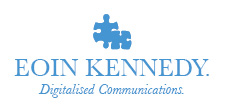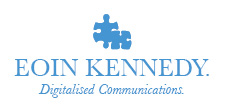The Business case for Social Media
The IIA Social Media working group recently organised an afternoon session with Neville Hobson entitled The Business Case for Social Media. The session was well chaired by Brendan Hughes and viewed remotely by students of the Tipperary Institute courtesy of Bernie Goldbach. Neville has great insights into experiences of trying to get companies to experiment with social media. Some of the expected issues popped up including the difficulty of identifying evangalists within an organisation, the absolute lack of knowledge of what social is and can do and the need to show return on investment before considering it as a medium. All of these are overcomeable hurdles but social media is not exactly new and the pace of progress is still very slow.
I understand that there is a clear need to correctly identify and match a company to the media used but a huge amount of opportunities are being missed by analysis/paralysis. A lot could be gained by simple experimentation.
Within the public relations field alone huge amount of energy and resources are spent in getting the story and messaging correct. This then get channelled into tools like press releases, feature pitches, interview hooks etc but a lot of it dies a death after it has been issued in the normal fashion to traditional media. The best some of this achieves is print coverage in the media and perhaps an online footprint if the publication had an online version.
It is a real shame not to maximise all this effort by using the other tools that are out there. Video/audio recording the event/interview gives people a more rounded version that the static written word. Once due care is given to the sensitivites of other platforms such as Facebook, Blog, Twitter and Social Bookmarking a lot more can be achieved. Very few companies are Search Engine Optimising the releases that they generate. This is not about blindly posting the press release and photos in lots of places but utilising and customing the underlying messaging and content to create engagement within different communities.
So what the problem. Numerous but take two of them. The PR industry has been a bit like an oil tanker and slow to invest in learning how to use these tools and still see print and radio coverage as the job done. The images and content then reside on a file server until someone asks for it. Many do not engage in the online conversation in any meaningful way and scoff at them in terms of impact due to ignorance. However how many do not use search engines as their primary research tool and possibly wonder why other brands or companies rank higher. This is within their control as strong content generators. On the client side of the fence lack of familarity raises all sorts of fears – some founded some as a result of scare mongering. Its easier to miss an opportunity where there is fear about making exposed online error.
So whats the answer. Best practice says you undertake a detailed landscape mapping exercise and build a cohesive online strategy before you do anything but another pragmatic approach is to experiment. Do enough due dilligence but dont let it stop you from using some of the online opportunities that are there now. Life moves fast in the online world, communities and tools change rapidly so the winning companies are those that can merge strategy with reseach, speed and experimentation.



2 Comments. Leave new
Hi Eoin. Great review of the meeting and elaboration of the implication for PR professionals. A big difference for PR I imagine is that you are no longer just managing a handful of journalists. You now have to manage a multitude of other ‘influencers’ in online communities. The rules are different, these influencers don’t answer to anyone. Companies need to own the communications in this sphere but I’ve seen plenty of cases where the lack of professional communications advice is clearly missing and this is where things can go very wrong. The role of PR is still central, albeit different.
Well said. Just found your piece, via LinkedIn. How can we get people to experiment, rather than analyse? I wonder. I’ve been working with one organisation, helping one person get started with a blog into which many can contribute. It’ll make a good case study.
Thanks again.